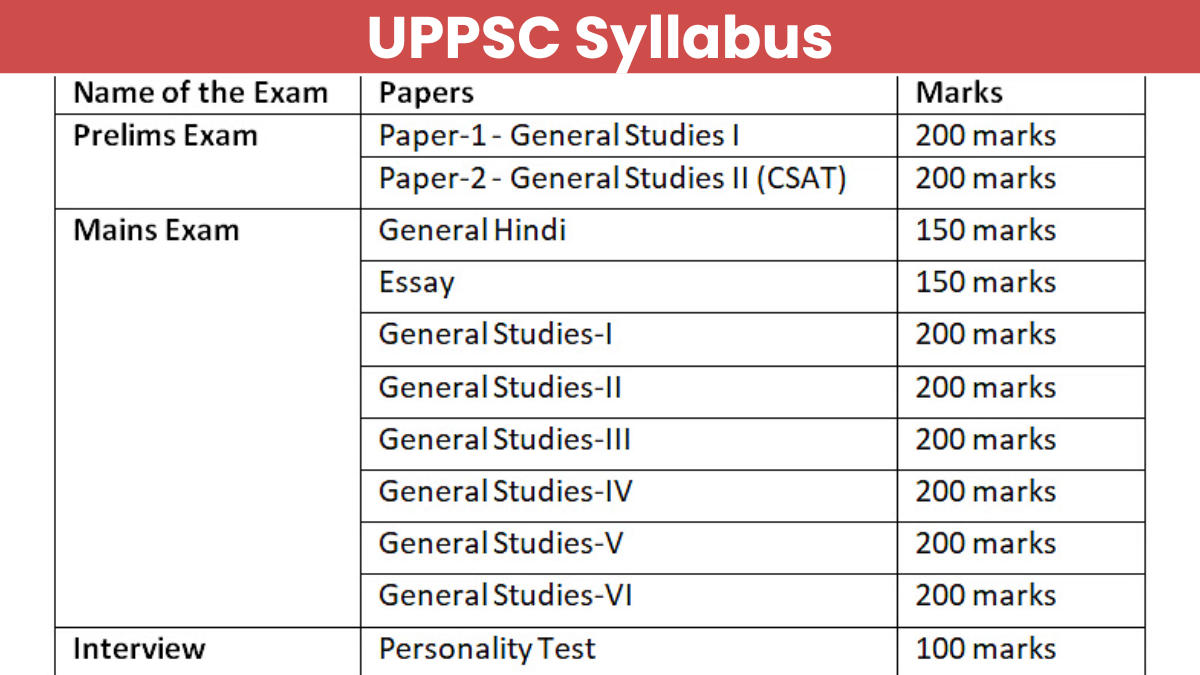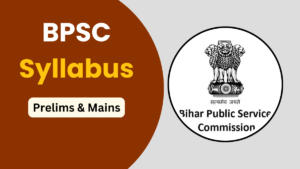Table of Contents
The UPPSC has released the syllabus for the 2025 Prelims and Mains exams in its official notification. Knowing the syllabus helps you understand the subjects, topics, and question types. To succeed, candidates should practice these syllabus topics regularly. Below, we have provided the syllabus for Hindi, Essay, General Studies 1, and General Studies 2 for both Prelims and Mains exams, covering all subjects. Read and bookmark this article for full information on the UPPSC Syllabus and Exam Pattern.
UPPSC Syllabus and Exam Pattern 2025
UP PSC Syllabus 2025 Highlights
The syllabus may vary by exam level, so it is important to check the official notification for the correct syllabus for each phase. Look out the table here:
| UPPSC Syllabus 2025 Highlights | |
| Name of Organization | Uttar Pradesh Public Service Commission |
| UPPSC Notification 2025 | Released |
| Category | Syllabus and Exam Pattern |
| UPPSC Exam Structure | Prelims, Mains, and Interview |
| Job Location | Uttar Pradesh |
| UPPSC official website | uppsc.up.nic.in |
UPPSC Exam Pattern 2025
| UPPSC Exam Pattern 2025 | ||
| Name of the Exam | Type of the Exam/Time | Marks |
| UPPSC Prelims Exam | Paper 1: General Studies I | 150 marks |
| Paper 2: General Studies II (CSAT) | 100 marks | |
| UPPSC Mains Exam | General Hindi | 150 marks |
| Essay | 150 marks | |
| General Studies I | 200 marks | |
| General Studies II | 200 marks | |
| General Studies III | 200 marks | |
| General Studies IV | 200 marks | |
| General Studies V | 200 marks | |
| General Studies VI | 200 marks | |
| UPPSC Interview | Personality Test/Interview | 100 marks |
UPPSC Prelims Exam Pattern 2025
| UPPSC Prelims Exam Pattern | |
| Name of Exam | UPPSC Combined State/Upper Subordinate Services (Preliminary) Examination |
| UPPSC PCS Prelims 2025 |
|
| Duration of Exam | Timings:
|
| Maximum Marks |
|
| Number of Questions | Paper I – 150 questions
Paper II – 100 questions |
| Type of Exam | Paper and paper-based and on OMR sheets. |
| Nature of Questions | All the questions will be of Objective type where an aspirant has to mark a correct option among the given options. |
| Negative Marking | As per the new UPPSC PCS exam pattern, there will be a 0.33% negative marking for each incorrect answer. It means for every 3 wrong answers, an aspirant will lose marks for 1 correct question |
UPPSC Mains Exam Pattern 2025
Checkout the UPPSC Mains Syllabus with exam pattern:
|
UPPSC Mains Exam Pattern 2025 |
|
| Name of Exam | UPPSC Combined State/Upper Subordinate Services Mains Exam |
| Number of Papers |
– General Hindi
– Essay – General Studies I – General Studies II – General Studies III – General Studies IV – General Studies V – General Studies VI |
| Maximum Marks |
– General Hindi: 150 marks
– Essay: 150 marks – All General Studies Papers and Optional subject papers: 200 marks each Total Marks: 1500 marks |
| Type of Exam |
Offline (Pen-paper)
|
| Nature of Questions |
Essay/descriptive type
|
UPPSC Syllabus 2025 PDF
The Uttar Pradesh Public Service Commission (UPPSC) has released the UPPSC Syllabus 2025 in its official exam notification. This syllabus includes all the topics that will be covered in the exam. In this article, candidates can download the UPPSC Syllabus 2025 PDF for easy reference.
Check: UPPSC Syllabus 2025 PDF Download
UPPSC Prelims Syllabus 2025
UPPSC Prelims Syllabus Paper 1
Here is the UPSC Syllabus 2025 for Prelims GS Paper 1 to help you prepare for the civil service exam:
- Current Events: Knowledge of important national and international events.
- Indian History: Includes Ancient, Medieval, and Modern History, with a focus on social, economic, and political changes, and the Indian National Movement.
- Geography: Covers India’s Physical, Social, and Economic Geography, as well as general World Geography.
- Indian Polity and Governance: Understanding the Indian political system, Constitution, Public Policy, Panchayati Raj, and Economic policies.
- Social and Economic Development: Topics like Sustainable Development, Poverty, Demographics, and Social Sector Programs.
- Environment: General understanding of Environmental Ecology, Biodiversity, Climate Change, and how they connect with population and modernization.
Paper 2 includes: This paper tests candidates on their ability to analyze and make decisions.
- Reading comprehension
- Decision-making skills
- Logical reasoning
- Verbal and non-verbal reasoning
- Quantitative aptitude
Check out the important topics below
Important Topics From UPPSC Pre Syllabus
Here are the topics with the number of questions asked in the UPPSC General Studies Prelims.
Top Priority:
- History: Art & Culture (16 Q), Nationalist Movement (11 Q), Struggle for Swaraj (9 Q), Buddhism & Jainism (11 Q), Bhakti & Sufi Saints (5 Q)
- Geography: Climatology, Economic Geography (29 Q), Physiography of India (16 Q)
- Polity: Union & State Legislature (25 Q), Executive (14 Q), Constitutional Bodies (12 Q), Judiciary (8 Q)
- Economy: Banking & Monetary Policy (24 Q), Growth & Development (15 Q), Indian Agriculture (14 Q), External Sector (12 Q)
Medium Priority:
- History: Social & Cultural Awakening (7 Q), Administrative Changes (7 Q), Nationalist Movement 1858-1905 (6 Q), Mughal Era (7 Q)
- Geography: World Political Geography (9 Q), India Political Geography (8 Q), River System (8 Q)
- Polity: Fundamental Rights (6 Q), Local Government (6 Q), Schedules (5 Q)
- Economy: RBI & Monetary Policy (10 Q), Government Budgeting (8 Q), Financial Markets (6 Q)
Low Priority):
- Ancient History: Vedic Culture, Harappan Sites, Ashokan Inscriptions (1-2 Q each), Indian Philosophy (2 Q)
- Medieval History: Delhi Sultanate, Vijayanagar Empire, Temple Architecture (1-2 Q each)
- Geography: Oceanography (5 Q)
- Polity: Fundamental Duties (3 Q), Emergency (2 Q)
- Economy: International Organizations (7 Q), Financial Inclusion (5 Q), Investment Model (4 Q), Issues related to Planning (2 Q)
Focus on high-priority topics and link conventional areas to current affairs for better preparation.
UPPSC Mains Syllabus 2025
The UPPSC PCS Mains Exam consists of eight papers, with the marks obtained in these papers being used to prepare the UPPSC Final Merit List. For a detailed overview of the UPPSC Syllabus for PCS Mains, refer to this section. The UPPSC Mains Syllabus generally includes the following sections:
- General Studies Papers: Covering a range of subjects to test overall knowledge and understanding.
- Optional Subject Papers: Based on the subject chosen by the candidate.
- Hindi Paper: Qualifying in nature, meaning it is required to pass but does not contribute to the final merit list.
The final merit list will be based on the marks secured in the other papers of the Mains examination.
- Hindi Paper
- Essay Writing
- GS Paper 1
- GS paper II
- GS Paper III
- GS Paper IV
- GS Paper V
- GS Paper VI
UPPSC Mains Syllabus for Essay Writing
There will be three sections in the question paper. Candidates must write an essay on one topic from each section in 700 words. In the three sections, the topics of the essay will be based on the following areas:
- Section A: Literature and Culture, Social Sphere, Political Sphere.
- Section B: Science, Environment and Technology, Economic Sphere Agriculture, Industry, and Trade.
- Section C: National and International Events, Natural Calamities, Landslide, Earthquakes, Deluge, Drought, etc. National Development programs and projects.
UPPSC Mains Syllabus for GS Paper 1
UPPSC Syllabus for UPPSC Mains GS1 is mentioned below:
- Modern Indian history (from A.D. 1757 to A.D. 1947): Significant events, personalities, issues, etc.
- The Freedom Struggle – its various stages and important contributors/contributions from different parts of the country.
- Post-independence consolidation and reorganization within the country (till A.D. 1965).
- The history of the world will include events from the 18th century to the middle of the 20th century such as the French Revolution of 1789, the Industrial Revolution, the World Wars, the redrawing of national boundaries, Socialism, Nazism, Fascism, etc. – their forms and effects on society.
- Salient features of Indian Society and culture.
- Role of Women in society and women’s organizations, population, and associated issues, poverty and developmental issues, urbanization, their problems, and their remedies.
- Meaning of liberalization, privatization, and globalization and their effects on the economy, polity, and social structure.
- Social empowerment, communalism, regionalism, and secularism.
- Distribution of major natural resources of the World – Water, Soils, and Forests in South and Southeast Asia with special reference to India. Factors responsible for the location of industries (with special reference to India).
- Salient features of Physical Geography – Earthquake, Tsunami, Volcanic activity, Cyclone, Ocean Currents, Winds, and Glaciers.
- Oceanic resources of India and their potential.
- The human migration-refugee problem of the World with a focus on India.
- Frontiers and boundaries concerning the Indian subcontinent.
- Population and Settlements – Types and Patterns, Urbanization, Smart Cities, and Smart Villages.
UPPSC Mains Syllabus for GS Paper 2
The UPPSC Syllabus for UPPSC Mains GS2 is mentioned below :
- Indian Constitution: historical underpinnings, evolution, features, amendments, significant provisions, and basic structure; the role of the Supreme Court in the evolution of basic provisions of the Constitution.
- Functions and responsibilities of the Union and the States: issues and challenges about the federal structure, devolution of powers and finances up to local levels, and challenges therein.
- Role of the Finance Commission in center-state financial relations.
- Separation of powers, dispute redressal mechanisms, and institutions. Emergence and use of alternative dispute redressal mechanisms.
- Comparison of the Indian constitutional scheme with that of other major democratic countries.
- Parliament and state legislatures: structure, functioning, conduct of business, powers and privileges, and concerned issues.
- Structure, organization, and functioning of the Executive and the Judiciary.
UPPSC Mains Syllabus for GS Paper 3
The syllabus for UPPSC Mains GS3 is mentioned below :
- Economic planning in India, objectives and achievements. Role of NITI Aayog, Pursuit of Sustainable Development Goals (SDGs).
- Issues of Poverty, Unemployment, Social Justice, and Inclusive Growth.
- Components of Government Budgets and Financial System.
- Major Crops, Different types of irrigation and irrigation systems, storage, transport, and marketing of agricultural produce, and e-technology in the aid of farmers.
- Issues related to direct and indirect farm subsidies and minimum support prices, Public Distribution System- objectives, functioning, limitations, revamping, issues of buffer stocks and food security, and Technology missions in agriculture.
- Food processing and related industries in India- scope and significance, location, upstream and downstream requirements, supply chain management.
- Land reforms in India since independence.
- Effects of liberalization and globalization on the economy, changes in industrial policy, and their effects on industrial growth.
- Infrastructure: Energy, Ports, Roads, Airports, Railways, etc.
- Science and Technology-developments and applications in everyday life and National Security, India’s Science and Technology Policy.
- Achievements of Indians in science & technology, indigenization of technology. Developments of New technologies, transfer of technology, dual and critical use technologies.
- Awareness in the fields of Information and Communication Technology (ICT) and Space Technology, Computers, Energy resources, nanotechnology, microbiology, and biotechnology. Issues relating to intellectual property rights (IPR), and digital rights.
- Environmental security and Ecosystems, Conservation of Wildlife, Biodiversity, Environmental pollution, and degradation, environmental impact assessment,
- Disaster as a Non-traditional security and safety challenge, disaster mitigation and management.
- Challenges of International Security: Issues of Nuclear proliferation, Causes and spread of extremism, Communication networks, the role of media and social networking, Basics of cyber security, money laundering, and human trafficking.
- India’s internal security challenges: Terrorism, corruption, insurgency, and organized crimes.
- The role, kind, and mandate of security forces, Higher defense organizations in India18- Specific knowledge of Uttar Pradesh Economy:- Overview of UP Economy: State Budgets. Importance of Agriculture, Industry, Infrastructure, and Physical Resources. Human Resources and Skill Development. Government Programmes and Welfare Schemes.
- Issues in Agriculture, Horticulture, Forestry, and Animal Husbandry.
UPPSC Mains Syllabus for GS Paper 4
The UPPSC Syllabus for UPPSC Mains GS4 is mentioned below :
- Ethics and the Human Interface: Explore the nature, causes, and effects of ethics on human behavior, including its various aspects in both personal and public life. The teachings of great leaders, reformers, and administrators highlight the importance of family, community, and educational institutions in shaping moral values.
- Attitude: Understand the concept of attitude, its structure, role, and how it influences cognition, behavior, political and moral views, social impact, and persuasion.
- Emotional Intelligence: Learn about the concept and dimensions of emotional intelligence and its practical application in administration and governance.
- Moral Thinkers and Philosophers: Study the contributions of moral thinkers and philosophers from India and around the world.
- Contributions of moral thinkers and philosophers from India and around the world.
- Integrity, impartiality, nonpartisanship, objectivity, commitment to public services, empathy, compassion, and sympathy for the weaker sections are among the qualities and core values of the civil service.
- Public Service Values and Ethics in Public Administration: Status and Problems, Ethical Concerns and Dilemmas in Government and Private Institutions, Laws, Rules, Regulations, and Conscience as Sources of Ethical Guidance, Accountability, and Governance.
- Probity in Governance: the concept of public service, the philosophical basis of governance and probity, information sharing, and transparency in government. Case studies on the above issues.
| General Studies Paper 5 | General Studies Paper 6 |
|---|---|
|
|
UPPSC Interview
The UPPSC Interview is the final stage of the UPPSC Exam 2025. Candidates who pass the Mains exam will be invited for a 100-mark interview. Conducted by a UPPSC-appointed board, the interview assesses the candidate’s suitability for state services. It focuses on academic knowledge, and current events, and tests mental and analytical abilities through a purposeful conversation.
| Related Articles | |
| UPPSC Previous Year Question Paper | UPPSC Exam Pattern 2025 |
| UPPSC Salary 2025 | UPPSC Eligibility Criteria |
| UPPSC Topper Strategies | Best Books for UPPSC |



 APSC Syllabus 2025, Download Prelims And...
APSC Syllabus 2025, Download Prelims And...
 Punjab PCS Syllabus 2025, New Prelims an...
Punjab PCS Syllabus 2025, New Prelims an...
 BPSC Syllabus 2025 and Exam Pattern For ...
BPSC Syllabus 2025 and Exam Pattern For ...
